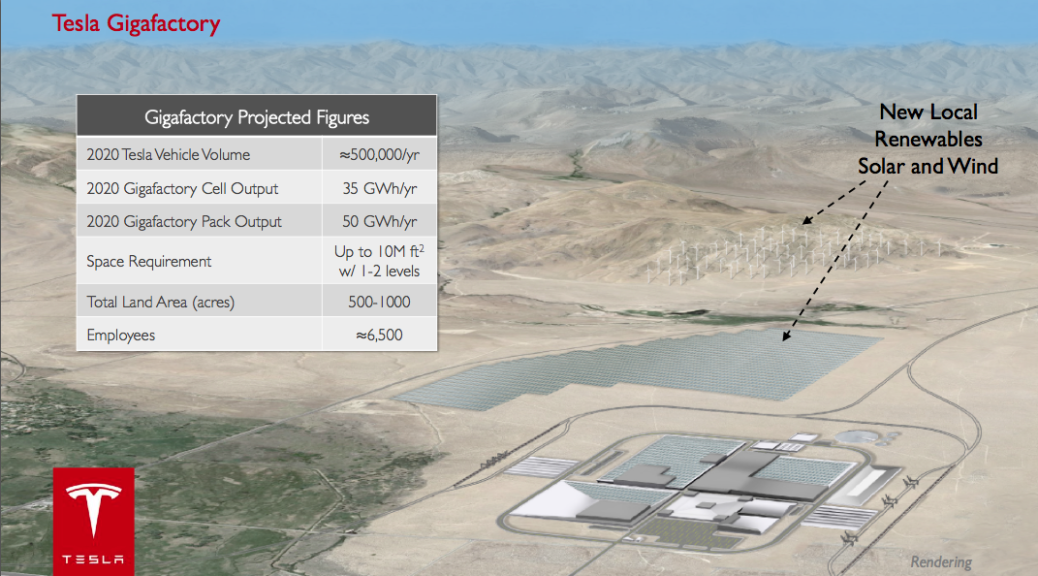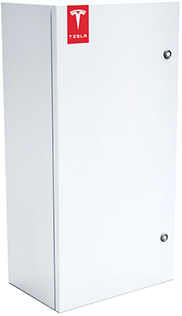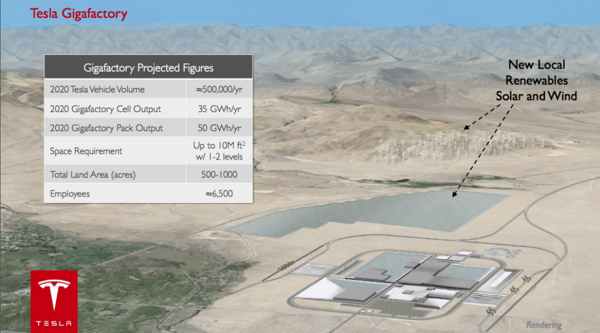Investor's Corner
Tesla Motors’ Residential Battery Pack, Lean on Details

Energy storage and Tesla Motors’ residential battery pack has been trending over the last couple of days since it was announced last week during the company’s conference call. In typical Musk fashion, the conference call reference was lean on details and provides the carrot for financial analysts to overlook it’s miss on revenue and earnings.

Tesla battery technology integrated into SolarCity residential solar system. (Image credit: Solar City)
The assumption is this battery pack production will be able to store energy from your solar panels and electric vehicle owners will be able to use that electricity to directly charge their cars.
This is an interesting play from Musk and direction for Tesla Motors due to the fact that residential battery storage doesn’t exist at this point—some pilots have been underway in California via Tesla. Some critics are saying Tesla may be getting sidetracked and would benefit from a more pragmatic CEO (think they said the same thing about Steve Jobs in early 80s).
They have a point. I write for a manufacturing software magazine, called Automation World, and this audience seems to be ideal market for battery storage, if the return on investment is right. However, while researching an upcoming feature article on energy management for manufacturers, plant floor production is just starting to focus on managing energy for bottom-line savings. Battery storage isn’t in the picture, yet—though commercial buildings might be easier to implement than manufacturers at the beginning.
So is Musk’s aim correct? Is residential battery storage ready?
Battery to power your home from @TeslaMotors – very appealing after going 6 days without power after Hurricane Sandy. http://t.co/QyIWRG8pfL
— Freyja Balmer (@bettyrocker) February 12, 2015
Again, Shah is talking about a lithium battery battery pack linked with solar. So what is the vision from Musk and JB Straubel?
From the conference call comments, Tesla said the design is finished. Musk says,
"We’re going to unveil some of the Tesla home battery consumer battery that will be for you using and people’s houses or businesses, fairly soon. We have the design done and it should start going into production probably about six months or so.”
So not much at this point and Musk once had hoped to leverage "used battery packs" as part of a greener energy storage solution for businesses or homes.
However, Tesla’s director of powertrain business development, Mateo Jaramillo, on the same podcast, says,“So will a used EV battery in seven or eight years be cheaper, more cost-effective to integrate into whatever application you’re trying to get into than a brand new battery in that year, says Jarmamillo. “Right now, the answer doesn’t look like to be yes.”
RELATED: [Podcast] Tesla’s Battery Storage Strategy
BMW is also starting a battery storage pilot program in California with Pacific, Gas and Electric, which we announced last month —Tesla and BMW Battery Packs to the Rescue?). Tesla has also said they are in talks with utilities and they are not enemies in this market play.
So there’s something here and it seems like Musk is porting over his Model S plan: create a market, create buzz and hope supporting market mechanisms will sprout up.
Jigar Shah makes a good point that utilities need to have real-time analytics and a communication infrastructure to provide energy pricing signals quickly to customers. Shah sees this support needed to help residential storage to make money and even “pool” their energy with other battery systems and sell it back to the grid.
Just like last year with the gigafactory, Tesla has teased a product with to the clean energy and business crowd. The wait won't be as long as the gigafactory in 2014, Musk said via the conference call last week that "a product unveiling is probably in the next month or two.”
We're ready PT Barnum/Nikola Tesla.

Elon Musk
SpaceX IPO could push Elon Musk’s net worth past $1 trillion: Polymarket
The estimates were shared by the official Polymarket Money account on social media platform X.

Recent projections have outlined how a potential $1.75 trillion SpaceX IPO could generate historic returns for early investors. The projections suggest the offering would not only become the largest IPO in history but could also result in unprecedented windfalls for some of the company’s key investors.
The estimates were shared by the official Polymarket Money account on social media platform X.
As noted in a Polymarket Money analysis, Elon Musk invested $100 million into SpaceX in 2002 and currently owns approximately 42% of the company. At a $1.75 trillion valuation following SpaceX’s potential $1.75 trillion IPO, that stake would be worth roughly $735 billion.
Such a figure would dramatically expand Musk’s net worth. When combined with his holdings in Tesla Inc. and other ventures, a public debut at that level could position him as the world’s first trillionaire, depending on market conditions at the time of listing.
The Bloomberg Billionaires Index currently lists Elon Musk with a net worth of $666 billion, though a notable portion of this is tied to his TSLA stock. Tesla currently holds a market cap of $1.51 trillion, and Elon Musk’s currently holds about 13% to 15% of the company’s outstanding common stock.
Founders Fund, co-founded by Peter Thiel, invested $20 million in SpaceX in 2008. Polymarket Money estimates the firm owns between 1.5% and 3% of the private space company. At a $1.75 trillion valuation, that range would translate to approximately $26.25 billion to $52.5 billion in value.
That return would represent one of the most significant venture capital outcomes in modern Silicon Valley history, with a growth of 131,150% to 262,400%.
Alphabet Inc., Google’s parent company, invested $900 million into SpaceX in 2015 and is estimated to hold between 6% and 7% of the private space firm. At the projected IPO valuation, that stake could be worth between $105 billion and $122.5 billion. That’s a growth of 11,566% to 14,455%.
Other major backers highlighted in the post include Fidelity Investments, Baillie Gifford, Valor Equity Partners, Bank of America, and Andreessen Horowitz, each potentially sitting on multibillion-dollar gains.
Elon Musk
Elon Musk hints Tesla investors will be rewarded heavily
“Hold onto your Tesla stock. It’s going to be worth a lot, I think. That’s my bet,” Musk said.

Elon Musk recently hinted that he believes Tesla investors will be rewarded heavily if they continue to hold onto their shares, and he reiterated that in a new interview that the company released on its social accounts this week.
Musk is one of the most successful CEOs in the modern era and has mammothed competitors on the Forbes Net Worth List over the past year as his holdings in his various companies have continued to swell.
Tesla investors, especially those who have been holding shares for several years, have also felt substantial gains in their portfolios. Over the past five years, the stock is up over 78 percent. Since February 2019, nearly seven years ago to the day, the stock is up over 1,800 percent.
Musk said in the interview:
“Hold onto your Tesla stock. It’s going to be worth a lot, I think. That’s my bet.”
Elon Musk in new interview: “Hold on to your $TSLA stock. It’s going to be worth a lot, I think. That’s my bet.” pic.twitter.com/cucirBuhq0
— Sawyer Merritt (@SawyerMerritt) February 26, 2026
It’s no secret Musk has been extremely bullish on his own companies, but Tesla in particular, because it is publicly traded.
However, the company has so many amazing projects that have an opportunity to revolutionize their respective industries. There is certainly a path to major growth on Wall Street for Tesla through its various future projects, including Optimus, Cybercab, Semi, and Unsupervised FSD.
- Optimus (Tesla’s humanoid robot): Musk has discussed its potential for tasks like childcare, walking dogs, or assisting elderly parents, positioning it as a massive long-term driver of company value.
- Cybercab (Tesla’s robotaxi/autonomous ride-hailing vehicle): a fully autonomous vehicle geared specifically for Tesla’s ride-sharing ambitions.
- Semi (Tesla’s electric truck, with mentions of expansion, like in Europe): brings Tesla into the commercial logistics sector.
- Unsupervised FSD (Full Self-Driving software achieving full autonomy without human supervision): turns every Tesla owner’s vehicle into a fully-autonomous vehicle upon release
These projects specifically are some of the highest-growth pillars Tesla has ever attempted to develop, especially in Musk’s eyes, as he has said Optimus will be the best-selling product of all-time.
Many analysts agree, but the bullish ones, like Cathie Wood of ARK Invest, are perhaps the one who believes Tesla has incredible potential on Wall Street, predicting a $2,600 price target for 2030, but this is not even including Optimus.
She told Bloomberg last March that she believes that the project will present a potential additive if Tesla can scale faster than anticipated.
Elon Musk
Tesla stock gets latest synopsis from Jim Cramer: ‘It’s actually a robotics company’
“Turns out it’s actually a robotics and Cybercab company, and I want to buy, buy, buy. Yes, Tesla’s the paper that turned into scissors in one session,” Cramer said.

Tesla stock (NASDAQ: TSLA) got its latest synopsis from Wall Street analyst Jim Cramer, who finally realized something that many fans of the company have known all along: it’s not a car company. Instead, it’s a robotics company.
In a recent note that was released after Tesla reported Earnings in late January, Cramer seemed to recognize that the underwhelming financials and overall performance of the automotive division were not representative of the current state of affairs.
Instead, we’re seeing a company transition itself away from its early identity, essentially evolving like a caterpillar into a butterfly.
The narrative of the Earnings Call was simple: We’re not a car company, at least not from a birds-eye view. We’re an AI and Robotics company, and we are transitioning to this quicker than most people realize.
Tesla stock gets another analysis from Jim Cramer, and investors will like it
Tesla’s Q4 Earnings Call featured plenty of analysis from CEO Elon Musk and others, and some of the more minor details of the call were even indicative of a company that is moving toward AI instead of its cars. For example, the Model S and Model X will be no more after Q2, as Musk said that they serve relatively no purpose for the future.
Instead, Tesla is shifting its focus to the vehicles catered for autonomy and its Robotaxi and self-driving efforts.
Cramer recognizes this:
“…we got results from Tesla, which actually beat numbers, but nobody cares about the numbers here, as electric vehicles are the past. And according to CEO Elon Musk, the future of this company comes down to Cybercabs and humanoid robots. Stock fell more than 3% the next day. That may be because their capital expenditures budget was higher than expected, or maybe people wanted more details from the new businesses. At this point, I think Musk acolytes might be more excited about SpaceX, which is planning to come public later this year.”
He continued, highlighting the company’s true transition away from vehicles to its Cybercab, Optimus, and AI ambitions:
“I know it’s hard to believe how quickly this market can change its attitude. Last night, I heard a disastrous car company speak. Turns out it’s actually a robotics and Cybercab company, and I want to buy, buy, buy. Yes, Tesla’s the paper that turned into scissors in one session. I didn’t like it as a car company. Boy, I love it as a Cybercab and humanoid robot juggernaut. Call me a buyer and give me five robots while I’m at it.”
Cramer’s narrative seems to fit that of the most bullish Tesla investors. Anyone who is labeled a “permabull” has been echoing a similar sentiment over the past several years: Tesla is not a car company any longer.
Instead, the true focus is on the future and the potential that AI and Robotics bring to the company. It is truly difficult to put Tesla shares in the same group as companies like Ford, General Motors, and others.
Tesla shares are down less than half a percent at the time of publishing, trading at $423.69.









